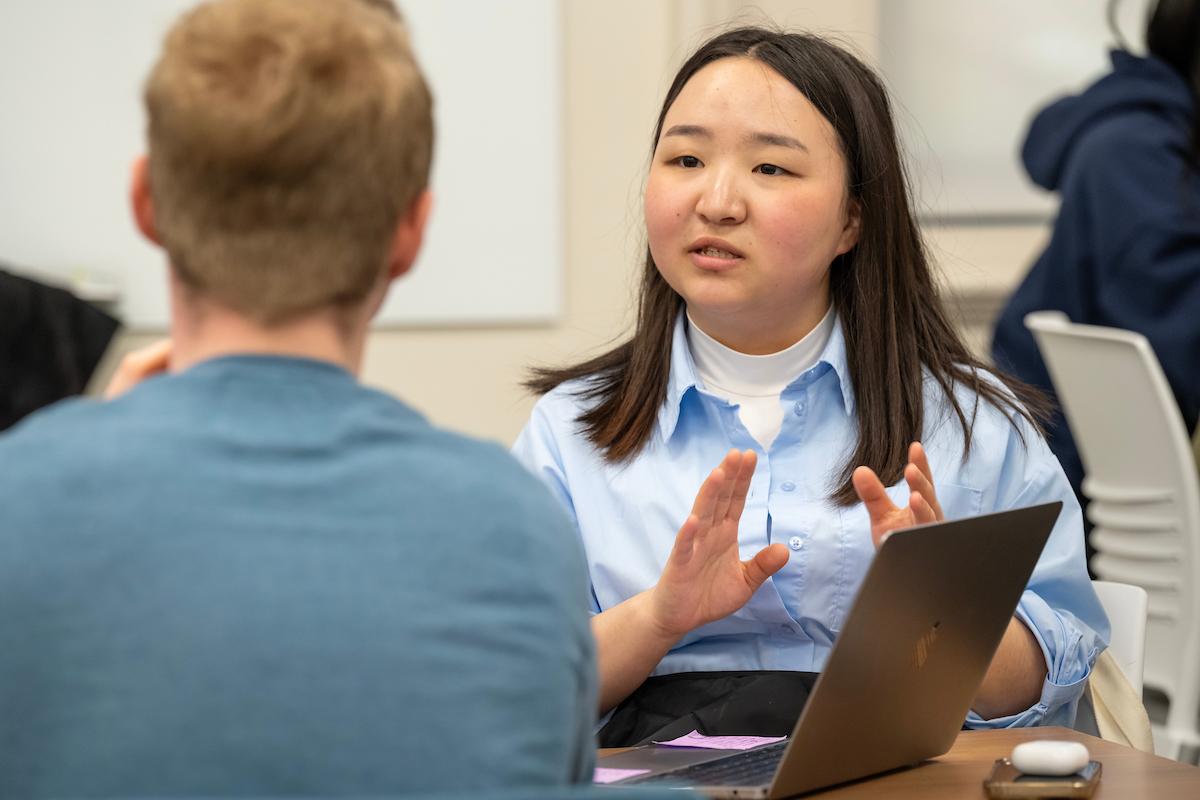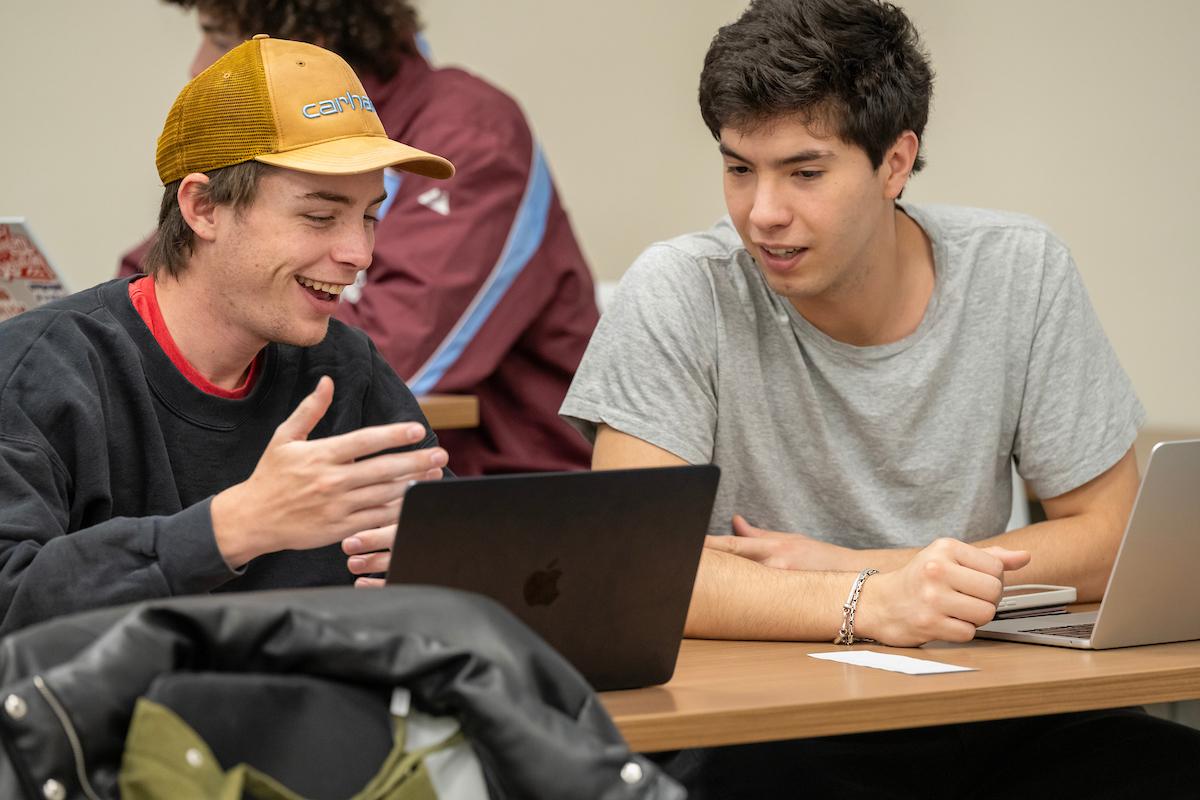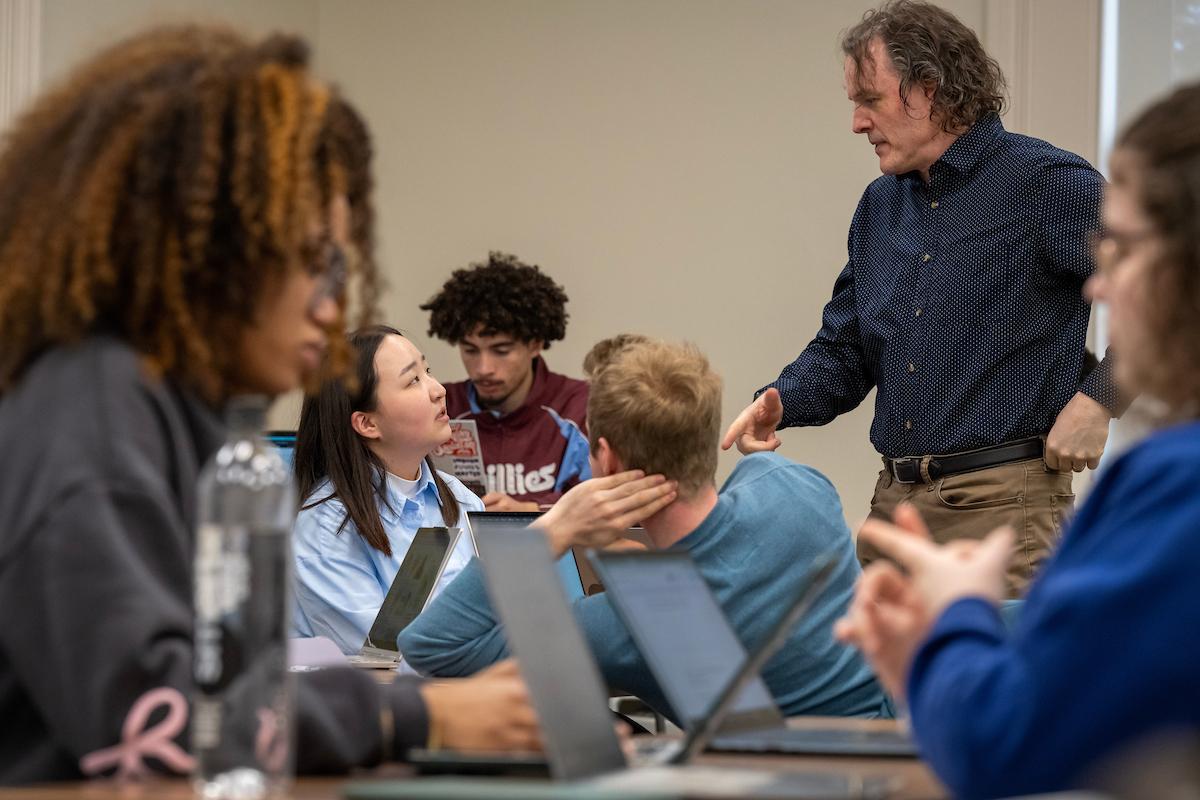F&M Stories
Students Study AI Ethics and Implications
As artificial intelligence systems accelerate at a rapid pace, the urgent need for a new generation of machine moderators is emerging. That generation starts in a classroom at F&M.
“Teaching and Learning Machine Ethics,” a spring course led by Assistant Professor of Computer Science Jason “Willie” Wilson, did more than explore the basic fundamentals of AI. It prepared students to teach machine ethics.
“How do we more broadly disseminate knowledge on the social and ethical implications of AI and other technologies?” Wilson asked students.
The course’s 21 students met twice a week, separated into seven groups based on interest and academic background.
One group dove into dating apps through a sociological lens. Another examined algorithmic bias in data science. Students interested in environmental ethics created a simulation to demonstrate the impact of constructing data centers in areas populated by Indigenous peoples. A group of computer science majors examined if machines are capable of making moral decisions.
“Students from all academic backgrounds were encouraged to consider this course,” Wilson said.
The class included students majoring in business, organizations and society; cognitive science; computer science; creative writing; data science; economics; moral psychology; neuroscience; psychology; and women's, gender and sexuality studies.
“Teaching and Learning Machine Ethics,” does more than explore the basic fundamentals of AI. It prepares students to teach machine ethics.
Each student group partnered with a faculty mentor to create curricular material to be used in future courses across campus.
The course’s 21 students met twice a week, separated into seven groups based on interest and academic background.
The significance of “Teaching and Learning Machine Ethics” will stretch far beyond the spring 2025 semester. Each student group partnered with a faculty mentor to create curricular material to be used in future courses across campus. Along the way, students learned fundamentals of computer science, AI, ethics and pedagogy.
“What we will work on moving forward is making this information accessible outside of F&M, so that other colleges can have access to creating components of machine ethics. Because in an age where machines and AI and technology affect everybody, we need it,” said Elshaddai “El” Muchuwa ’26, a government and cognitive science double major.
While Wilson taught the weekly class, he was quick to deflect credit to Lee Franklin, professor of philosophy and interim director of the Faculty Center, and rising senior Muchuwa. Both provided input and extensive planning into the Machine Ethics syllabus.
“El was the co-creator of this course and was deeply involved in all aspects of developing this course,” Wilson said.
“Teaching and Learning Machine Ethics” is facilitated in part by Wilson’s National Science Foundation CAREER grant. The $505,358, five-year grant – now in its second year – supports early-career faculty who have the potential to serve as academic role models in research and education, and to lead advances in the mission of their department or organization.
“There's a tone of ethics through everything I'm doing, both on the education side
and on the research side,” Wilson said. “As we look at rapidly growing AI, now is
when we need that perspective the most.”
“I’m interested in the regulation of AI and the policy around it, but I’m also interested
in the human aspect of it.”
When Muchuwa first arrived at F&M, he was set on majoring in government.
That changed when Muchuwa took “Minds, Machines & Morals” – a class requirement outside of his major – taught by Bennett Helm, F&M’s Elijah E. Kresge Professor of Philosophy and program chair of scientific & philosophical studies of mind.
“I didn't know that cognitive science existed as a major,” Muchuwa said.
He sought further opportunity to explore the computer science angle of government and cognitive science.
“I'm interested in the regulation of AI and the policy around it, but I'm also interested in the human aspect of it. I'm less interested in the intellectualization of it as much as I am the accessibility of it,” Muchuwa said.
Serendipitously, Wilson was in the beginning stages of creating the Machine Ethics syllabus and seeking student input.
In conjunction with Wilson, Franklin guided Muchawa through a process known as co-creation.
“Broadly speaking, co-creation describes any number of practices in which students are involved as partners in the development of, the maintenance of, or the revision and the review of educational practices,” Franklin said.
Examples of co-creation range from curricular design and review to specific interactions between students and individual faculty. In the case of Machine Ethics, co-creation was employed between each student group and their paired faculty member.
Co-creation strips away the typical faculty and student hierarchy, championing “principles of reciprocity and equality between faculty and students,” Franklin said.
The collaborative process does more than empower students. It leverages their expertise as “digital natives,” a term assigned to the current tech-savvy and digitally empowered generation of students.
“Faculty have distinctive expertise as scholars and experts in the fields. Students have their own set of expertise about being students,” Franklin said. “The partnership seeks to gain as much as possible from those complementary sets of expertise and from genuinely reciprocal, authentic interaction.”
In Franklin’s extensive study of co-creation examples, the Machine Ethics course stands out due to the highly collaborative process between student groups and their assigned faculty partner.
“I haven't come across any record of a co-creation process that looks like that,” he said. “This is really innovative.”
Ongoing research into robots and machine ethics has resulted in a prestigious National
Science Foundation CAREER grant for Jason “Willie” Wilson, assistant professor of
computer science at Franklin & Marshall College. Co-creation champions “principles of reciprocity and equality between faculty and
students.”
Willie Wilson Awarded NSF CAREER Grant for Computer Science
Related Articles
March 2, 2026
[Video] Thinkers, Doers, Diplomats: Maj. Gen. Richard P. Mills ’72 on the Spirit of Service
For Maj. Gen. Richard P. Mills ’72, an F&M education was the launchpad for a storied military career and a lifelong journey of discovery. As he watches today’s Diplomats walking the same paths he once did, Mills sees a familiar pilgrimage toward a future of influential leadership and engaged citizenship.
February 18, 2026
An AI Certificate to Prepare World-Ready Leaders
Franklin & Marshall College announced a distinctive interdisciplinary certificate to empower students to successfully lead and thrive in a rapidly evolving world. The Artificial Intelligence (AI) and the Liberal Arts Certificate is a reflection of the College's signature approach to examining AI through a blended lens of humanistic inquiry and technical proficiency.
February 16, 2026
Powering Innovation: Inside F&M’s Campus Supercomputer
Imagine 1,600 computer processors combining power toward one task. This is the engine driving innovation at F&M. Called a High-Performance Computing (HPC) cluster, this elite shared resource accelerates discovery, empowers large-scale research, and fuels the collaborative spirit that defines the F&M experience.



